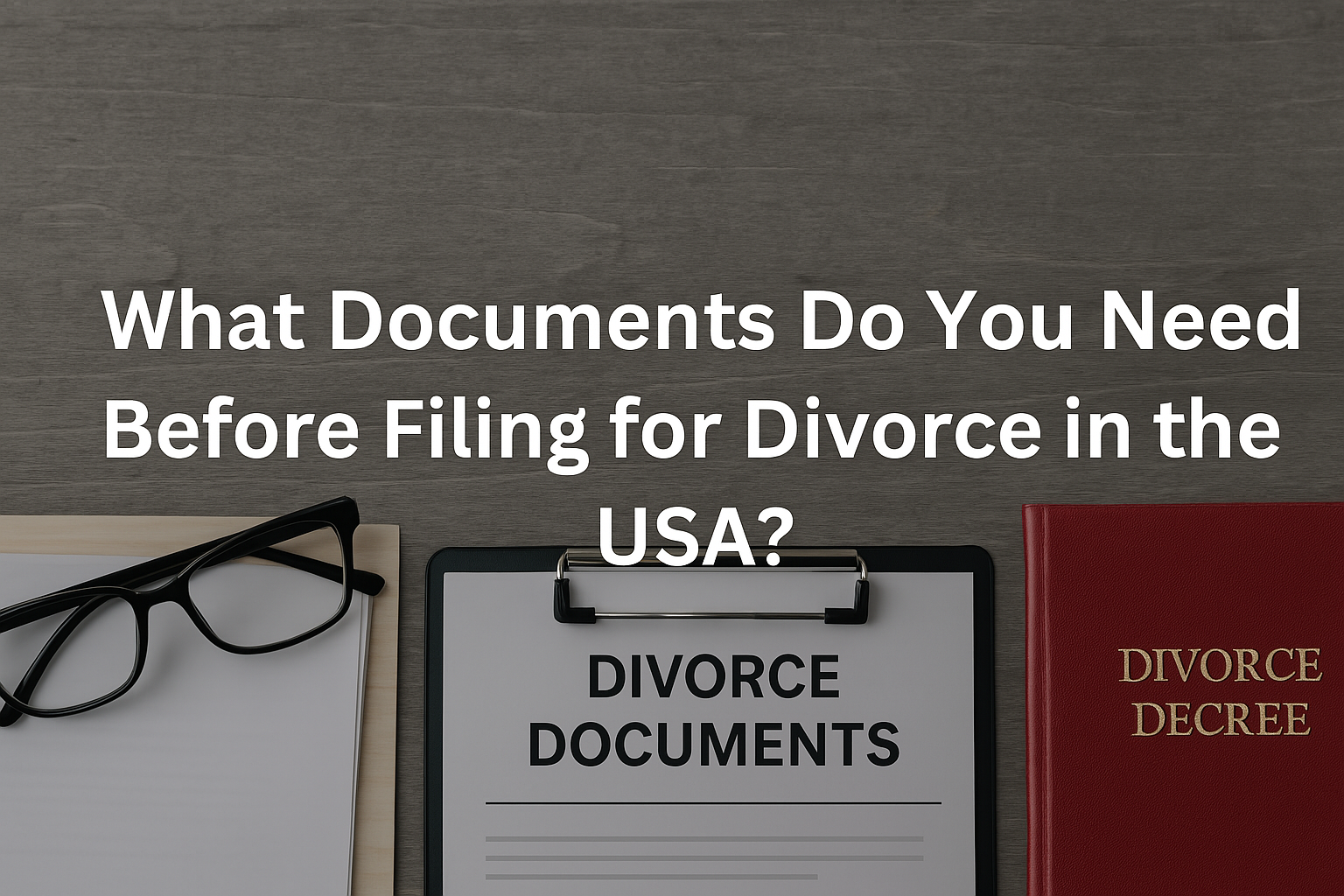📋 What Documents Do You Need Before Filing for Divorce in the USA?
Divorce can be emotionally and financially challenging. Whether it’s a mutual decision or a contested case, being prepared is crucial to protect your rights and future. One of the most important steps in the divorce process is gathering the right documents before filing.
In this guide, we’ll walk you through the essential documents you need to file for divorce in the U.S., especially if you’re dealing with issues like child custody, alimony, property division, or spousal support.
📌 Why You Need to Prepare Before Filing for Divorce
Before stepping into court or hiring a divorce attorney, it’s wise to have a clear picture of your financial and legal situation. Judges and mediators will rely heavily on paperwork to decide on matters like:
- Child custody and visitation rights
- Alimony (spousal support)
- Division of marital assets and debts
- Child support payments
The more organized you are, the better your chances of a fair and efficient divorce.

📂 Essential Documents Needed Before Filing for Divorce
Here’s a checklist of the key documents you should gather. We’ve also added why each is important and how it may influence your case.
1. ✅ Personal Identification Documents
These confirm your identity and residency—important for legal eligibility.
- Government-issued photo ID (Driver’s License, Passport)
- Social Security card
- Proof of U.S. residency (utility bill, lease agreement)

Tip: Residency requirements vary by state. Most states require at least 6 months of residency before filing for divorce.
2. 💼 Marriage Certificate
This is your legal proof of marriage and is mandatory to initiate the divorce process.
- Certified copy of your marriage license/certificate
- Any name-change documents
3. 💸 Financial Documents
These are the most critical documents and often influence child support, alimony, and division of assets.
a) Income Proof
- Pay stubs (last 6–12 months)
- W-2 and 1099 forms
- Recent tax returns (last 3 years)
- Profit & Loss statements (for self-employed individuals)
b) Bank & Investment Accounts
- Checking and savings account statements
- Retirement accounts (401k, IRA, pensions)
- Brokerage accounts
- Cryptocurrency wallets
c) Debts & Liabilities
- Credit card statements
- Mortgage and home equity loan details
- Auto loan, student loan, personal loan balances

“How to protect your retirement assets during divorce.”
4. 🏡 Real Estate and Property Records
Courts will need to know what’s considered marital property and what’s not.
- Property deeds or mortgage agreements
- Appraisals or valuation reports
- Rental agreements (if applicable)
- Timeshare agreements
5. 👨👩👧 Child-Related Documents
If children are involved, this section is non-negotiable for custody and support arrangements.
- Birth certificates of children
- School records and daycare expenses
- Medical insurance documents and health records
- Childcare costs and extracurricular activity bills
: “What courts look for in child custody cases.”
6. 📃 Legal Agreements & Prior Court Orders
Any existing agreements can affect your divorce outcome.
- Prenuptial or postnuptial agreements
- Legal separation agreements
- Protection or restraining orders
- Guardianship or custody orders
7. 🚗 Vehicle Information
Vehicles, like homes, can be considered marital assets.
- Vehicle titles or lease agreements
- Loan balances
- Vehicle registration
8. 📈 Business Ownership or Partnership Documents
If either spouse owns a business, valuation and ownership must be considered in the settlement.
- Articles of incorporation
- Partnership agreements
- Business tax returns
- Profit and loss statements
: “How divorce affects small business ownership.”
🔐 Bonus: Secure Your Documents
Divorce can get tense. Make sure you:
- Keep copies (both physical and digital)
- Store them in a secure place (cloud storage with 2FA is recommended)
- Don’t alter or hide documents — it can backfire legally
🧠 Final Thoughts: Be Prepared, Stay Empowered
Divorce is a legal process—and paperwork is power. The more prepared you are, the more control you have over your financial future, parenting rights, and peace of mind.
Thinking of filing for divorce without an attorney? Platforms like LegalZoom and RocketLawyer offer affordable options for online divorce filing.
📞 FAQs: Filing for Divorce in the USA
Q1: Do I need all these documents to start the divorce?
A: Not all at once, but the more you have early, the smoother the process. Some states may allow filing with just a few basic documents initially.
Q2: Can I file for divorce without an attorney?
A: Yes, especially in uncontested cases. But complex situations (like child custody or property disputes) are best handled with legal guidance.
Q3: How long does it take to finalize a divorce in the U.S.?
A: It depends on your state and situation. On average, it takes 3 to 12 months. Contested divorces can take longer.
Q4: Are online divorce platforms safe and legal?
A: Yes, services like LegalZoom and RocketLawyer are legal and safe for most uncontested divorces. Always verify if they’re approved in your state.
💬 Share Your Experience
Have you gone through a divorce and want to share your tips or stories? Drop a comment below or subscribe for weekly updates on family law, child custody, and financial planning post-divorce.
